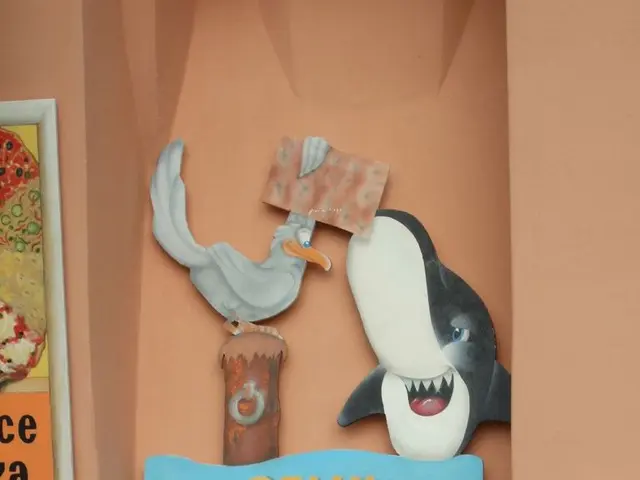US budget reductions lead to scientists losing their positions or funding. These scientists are now being courted by foreign universities for potential employment.
Amidst steep federal funding cuts to scientific research initiated by the Trump administration, thousands of researchers in the U.S. faced job losses and grant terminations. In response, countries such as Canada, France, and Australia have capitalized on this opportunity by launching programs dedicated to attracting early-career biomedical researchers.
The "Canada Leads" program, unveiled in April, aims to nurture the next generation of innovators by enticing U.S.-based researchers northward. Aix-Marseille University in France introduced the "Safe Place for Science" program in March, pledging a welcoming environment for American researchers who may feel at risk or hindered in their research. Australia's "Global Talent Attraction Program" announced in April offers competitive salaries and relocation packages.
Anna-Maria Arabia, head of the Australian Academy of Sciences, sees this situation as an unparalleled chance to attract top-tier intellects to the country. Since World War II, the U.S. has notably invested vast sums in scientific research, fostering cutting-edge discoveries like cell phones, the internet, and advancements in cancer treatment. While the current system faces disruption, the U.S. still maintains a significant lead in research and development funding.
Significant cuts to staff levels and grant funding at institutions like the National Science Foundation, National Institutes of Health, NASA, and other agencies have sparked concern among the academic community. These cuts have already led several universities to implement hiring freezes, layoffs, or pauses in graduate student admissions. On Thursday, the Trump administration revoked Harvard University's ability to enroll international students, although a judicial order temporarily halted this decision.
Recruiters worldwide have reported increased interest from U.S.-based researchers seeking new opportunities abroad. Nearly half of the applications to Aix-Marseille University's "Safe Place for Science" program came from U.S.-based scientists, with a similar trend observed in other recruitment efforts.
Academic freedom remains a top attraction for these researchers, with European Commission President Ursula von der Leyen stating her intention to enshrine it into European Union law. Eric Berton, president of Aix-Marseille University, emphasized that U.S. researchers aren't primarily interested in money but rather the preservation of their academic freedom.
Whether these programs can offset the funding losses in the U.S. remains unclear, but there is growing apprehension within the scientific community about the long-term consequences of these cuts. Patrick Cramer, head of the Max Planck Society, notes that science is a global endeavor, and disruptions in funding and collaborations threaten researchers worldwide.
- The government has instituted deep cuts to scientific research funding, causing job losses and grant terminations for thousands of U.S. researchers.
- In response to this, countries such as Canada, France, and Australia are capitalizing on the opportunity by launching programs to attract early-career biomedical researchers.
- The "Canada Leads" program, launched in April, aims to foster the next generation of innovators by attracting U.S.-based researchers.
- Aix-Marseille University in France revealed the "Safe Place for Science" program in March, pledging a welcoming environment for American researchers.
- Australia's "Global Talent Attraction Program," announced in April, offers competitive salaries and relocation packages.
- Anna-Maria Arabia, head of the Australian Academy of Sciences, views this situation as an unprecedented chance to attract top-tier intellects.
- Since World War II, the U.S. has invested significantly in scientific research, leading to groundbreaking discoveries like cell phones, the internet, and advancements in cancer treatment.
- Significant cuts to staff levels and grant funding at institutions like the National Science Foundation, National Institutes of Health, NASA, and other agencies have raised concerns within the academic community.
- These cuts have led to hiring freezes, layoffs, or pauses in graduate student admissions at several universities.
- On Thursday, the Trump administration revoked Harvard University's ability to enroll international students, a decision temporarily halted by a judicial order.
- Recruiters worldwide have noted an increase in interest from U.S.-based researchers seeking opportunities abroad.
- Nearly half of the applications to Aix-Marseille University's "Safe Place for Science" program were from U.S.-based scientists.
- European Commission President Ursula von der Leyen intends to enshrine academic freedom into European Union law.
- Eric Berton, president of Aix-Marseille University, states that U.S. researchers are primarily motivated by the preservation of their academic freedom, not just money.
- Whether these programs can offset the funding losses in the U.S. is uncertain, but there is growing anxiety within the scientific community about the long-term effects of these cuts.
- Patrick Cramer, head of the Max Planck Society, emphasizes that science is a global endeavor, and disruptions in funding and collaborations threaten researchers worldwide.
- Amidst these challenges, health-and-wellness, fitness-and-exercise, and workplace-wellness industries continue to thrive, offering jobs and opportunities.
- Climate change also remains a pressing issue, requiring focus from the environmental-science industry for solutions and adaptations.
- The finance industry, including personal-finance, banking-and-insurance, and investing, is undergoing significant changes due to political and economic factors.
- Space-and-astronomy, a fascinating field closely tied to science, continues to draw interest and funding from both government and private sectors.
- The decline in funding for scientific research has indirect effects on various industries, such as nutrition, therapies-and-treatments, and mental-health.
- In the lifestyle sector, trends continue to evolve, with fashion-and-beauty, food-and-drink, and travel adapting to consumer preferences and needs.
- The economic downturn has added pressure on the business sector, particularly on small and medium-sized enterprises, intensifying the need for career-development and learning.
- The sports industry, including sports like football, soccer, baseball, hockey, golf, basketball, racing, American football, tennis, mixed-martial-arts, and sports-betting, is resilient, offering diverse employment opportunities.
- Sustainability and green initiatives have become increasingly important in industries such as home-and-garden, technology, and even sports and fashion, reflecting growing public interest in addressing climate-change and promoting a healthier environment.








